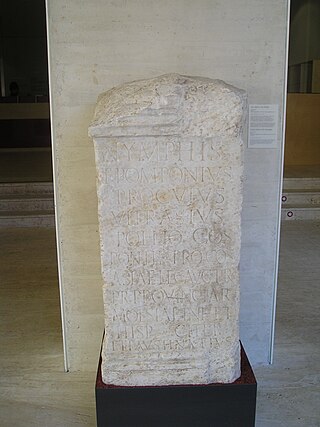Related Research Articles

Titus Pomponius Proculus Vitrasius Pollio was a Roman senator, who held several imperial appointments during the reign of Marcus Aurelius. He was suffect consul in an undetermined nundinium around 151; he was a consul ordinarius in the year 176 with Marcus Flavius Aper as his colleague.
Lucius Hedius Rufus Lollianus Avitus was a Roman senator and military officer. He was consul in the year 144 as the colleague of Titus Statilius Maximus.
Lucius Nonius Calpurnius Torquatus Asprenas was a Roman senator who achieved the office of consul ordinarius twice, first under Domitian and later under Hadrian.
Sextus Erucius Clarus was a Roman senator and aristocrat. He was Urban prefect and twice consul, the second time for the year AD 146. Clarus was the nephew of Gaius Septicius Clarus, a friend of Pliny the Younger.
Gaius Bellicius Flaccus Torquatus was a Roman senator during the reign of Antoninus Pius. He was consul prior in 143 with Herodes Atticus as his colleague. Flaccus Torquatus was the son of Gaius Bellicius Flaccus Torquatus Tebanianus, consul of 124, and the older brother of Gaius Bellicius Calpurnius Torquatus, consul of 148.
Gaius Bellicius Calpurnius Torquatus was a Roman senator during the reign of Antoninus Pius. He was consul posterior in 148 as the colleague of Lucius Octavius Cornelius Publius Salvius Julianus Aemilianus. Calpurnius Torquatus was the son of Gaius Bellicius Flaccus Torquatus Tebanianus, consul of 124, and the younger brother of Gaius Bellicius Flaccus Torquatus, consul of 143.
Gaius Aufidius Victorinus was a Roman senator and general of the second century. A friend of the Emperor Marcus Aurelius and the son-in-law of the advocate and orator Marcus Cornelius Fronto, he was twice consul and governor of several Roman provinces.
Publius Martius Verus was a Roman senator and general. He was twice consul. Verus played a major role in the suppression of the revolt of Avidius Cassius by remaining loyal to the emperor Marcus Aurelius.
Marcus Metilius Aquillius Regulus was a Roman senator of the second century AD. A member of the patrician order, he held the office of consul ordinarius in 157 with another patrician, Marcus Vettulenus Civica Barbarus, as his colleague.
Gaius Arrius Antoninus was a Roman senator and jurist active in the last half of the second century AD, who held a number of offices in the emperor's service. The date when he was suffect consul is not attested, but has been estimated to be around AD 173. Edward Champlin includes him, along with Gaius Aufidius Victorinus and Tiberius Claudius Julianus, as "marked out as a special intimate of Fronto's." Champlin notes that while Victorinus received five of the surviving letters of the rhetor Fronto, "as the beloved pupil and son-in-law", Antoninus received four, taking "the place of Fronto's son."
Quintus Camurius Numisius Junior was a Roman senator active during the later second century AD. He was suffect consul for a nundinium in the first half of the year 161 as the colleague of Marcus Annius Libo.
Tiberius Claudius Julianus was a Roman senator and literary figure who held several offices in the imperial service during the later second century AD. He was suffect consul during the nundinium of September-October 154 with Sextus Calpurnius Agricola as his colleague.
Lucius Nonius Calpurnius Torquatus Asprenas was a Roman senator of the early Roman Empire, who flourished under the reigns of Nero and Vespasian. He was suffect consul around the year 78.
The gens Bellicia was an aristocratic plebeian family at ancient Rome, which flourished during the first and second centuries. The Bellicii rose to prominence from Gallia Narbonensis, attaining senatorial status with Gaius Bellicius Natalis, who was appointed consul suffectus in AD 68.
Lucius Neratius Proculus was a Roman senator, who held several posts in the emperor's service. He was suffect consul in either the year 144 or 145. Proculus is known primarily from inscriptions.
Quintus Cornelius Proculus was a Roman senator, who was active during the middle of the second century AD. He was suffect consul in the nundinium of November–December 146 as the colleague of Lucius Aemilius Longus. Proculus is known entirely from inscriptions.
Lucius Sergius Paullus was a Roman senator, who was active during the reign of Marcus Aurelius. He was twice consul: the first time attested 23 September of an unknown year as suffect consul with [? Lucius Nonius Calpurnius] Torquatus Asprenas as his colleague; and as consul ordinarius for 168 as the colleague of Lucius Venuleius Apronianus Octavius Priscus.
Gaius Julius Bassus was a Roman senator, who was active during the reign of Antoninus Pius. He was suffect consul in the nundinium of November-December 139 as the colleague of Marcus Ceccius Justinus. He was the son of Gaius Julius Quadratus Bassus, consul in 105. The Julii Bassi were a prominent family of Pergamum, that had descended from the Attalid dynasty and Galatian tetrarchs.
Publius Cluvius Maximus Paullinus was a Roman senator, who held a number of imperial appointments during the reigns of Hadrian and Antoninus Pius. He was suffect consul during an undetermined nundinium between 139 and 143. He is known entirely from inscriptions.

Marcus Macrinius Avitus Catonius Vindex was a Roman senator who was active during the reign of Marcus Aurelius. Originally a member of the equestrian order, Vindex demonstrated courage and intelligence that led to his award of dona militaria and elevation into the Senate, followed by his appointment to the consulate, which Géza Alföldy dates to an undetermined nundinium around the year 175.
References
- ↑ Werner Eck, "Hadrianische Konsuln. Neue Zeugnisse aus Militärdiplomen", Chiron , 32 (2002), p. 482
- ↑ Géza Alföldy, Konsulat und Senatorenstand unter der Antoninen (Bonn: Rudolf Habelt Verlag, 1977), p. 313
- ↑ James H. Oliver, "The Senatorial but Not Imperial Relatives of Calpurnia Arria", American Journal of Archaeology , 55 (1951), pp. 347-349
- ↑ Alföldy, Konsulat und Senatorenstand, pp. 323f